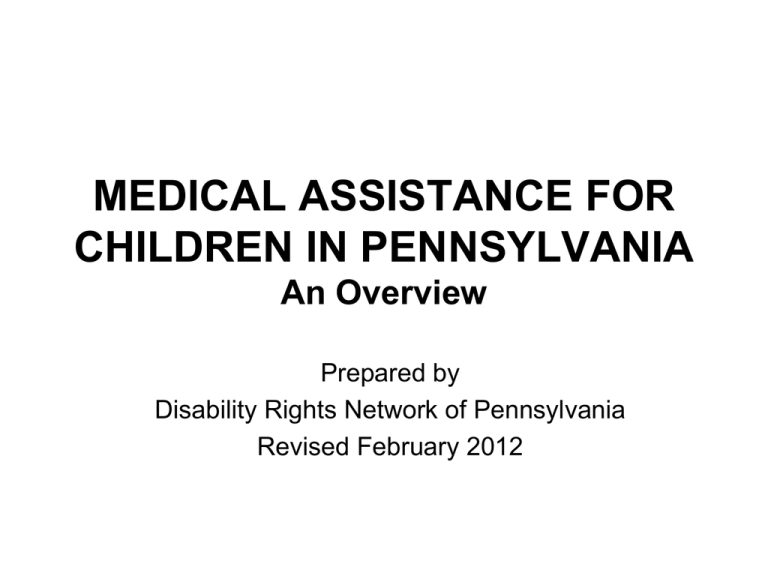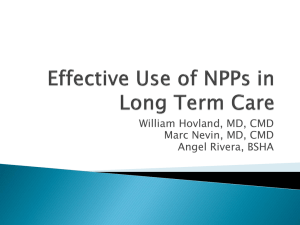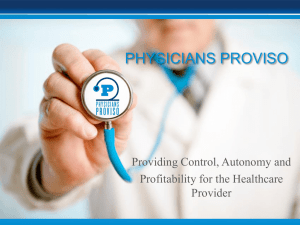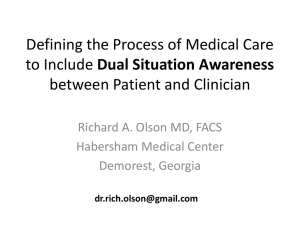How Is Medical Assistance (MA) - Disability Rights Network of
advertisement

MEDICAL ASSISTANCE FOR CHILDREN IN PENNSYLVANIA An Overview Prepared by Disability Rights Network of Pennsylvania Revised February 2012 Who Is Eligible? • Medical Assistance (MA), or Medicaid, is a lowincome health insurance program, but: – In Pennsylvania, parental income does not count for children with significant disabilities. (Child support is parental income.) As a result, almost all children with disabilities in Pennsylvania are eligible. – Income in the child’s name (e.g., trust income in many cases) does count. – SSDI benefits for a child under the age of 18 do not count. – Having private insurance does not make a child ineligible for MA, but private insurance must first be used. How Is Medical Assistance (MA) Delivered in Pennsylvania? • Physical Health – HealthChoices – managed care health plans – Primary Care Case Management – ACCESS Plus – Fee-for-Service – ACCESS • Most children are in managed care health plans or ACCESS Plus for physical health. • Behavioral Health – behavioral health managed care plans • All children are in behavioral health managed care plans. What Is Covered? • Early and Periodic Screening, Diagnosis and Treatment (EPSDT) – All children on Medical Assistance (MA) under age 21 are entitled to EPSDT. This includes virtually all medical services that are necessary to treat an illness, condition, or disability. – Most, but not all, services are considered “medical services.” What Are Examples of Covered Services? • Physician services, hospital services, therapies, lab work • Personal care, home health services, skilled nursing • Diapers for children over age 3 (or who have extraordinary needs) • Prescription medication and nutritional supplements • Augmentative communication devices (speech generating devices) and FM systems • Wheelchairs and eyeglasses (no limits on how often they can be replaced for persons under age 21) • Case management What Is Not Covered? • Services not covered under EPSDT are few but include: – purely educational services – purely vocational services – “habilitation” (training) services (as opposed to rehabilitation services, which are covered) – home and vehicle modifications (as opposed to home equipment, which is covered) – respite (as opposed to home health services or personal care services, which are covered) Medicaid Home and Community-Based Waivers • Some children, particularly those with intellectual disabilities, are also eligible for Medicaid (Medical Assistance) Home and CommunityBased Waiver services, which generally cover those items described above that are not otherwise covered (e.g., respite, home and vehicle modifications, and habilitation services). • Waivers have caps on the number of people accepted. • There can be long waiting lists. What Is HealthChoices? • Most children in Pennsylvania who apply for Medical Assistance are required to choose a managed care health plan for their physical health care. All children (and adults) are automatically enrolled in their county’s behavioral health managed care plan. • Children must use providers in their physical and behavioral health managed care plans’ networks (exceptions can be sought), and they must get prior authorization for most services. • Each of the physical health plans has a Special Needs Unit that should help families with service access issues or other needs. How Are Physical Health Services Requested? • Most services require prior authorization by the managed care health plan or, if ACCESS Plus or Fee-for-Service ACCESS, by the Office of Medical Assistance Programs. • The physician, and other evaluating or treating medical professionals, must show that the service is medically necessary. How Are Physical Health Services Requested? (Continued) • In addition to a physician prescription, physicians, and other evaluating or treating medical professionals, should submit Letters of Medical Necessity to explain the need for the service. Letters should: – explain the child’s medical conditions and functional limitations and needs (in both clinical and lay-person terms) – describe the purpose of the service and the consequences of not providing it – explain why any less expensive measures are inadequate What if the School or Early Intervention (EI) Program Could Provide the Services? • Services may not be denied on the basis that the school or EI program should be providing them, but services may be denied if the school or EI program is already fully meeting the child’s medical needs. • If the child is receiving some of the same or similar services from the school or EI program (e.g., if the child is getting group speech therapy at school but needs one-on-one therapy, is getting 1 hour a week of physical therapy at school but needs 3 hours, or gets services during the school year but not in the summer), the Letter of Medical Necessity should acknowledge what the child is already getting and explain why something more or different is needed. • The physician can participate in an Individualized Education Program (school) or Individualized Family Service Plan (EI) team meeting as needed. Prescribing What Is Medically Necessary • Managed care health plan or Office of Medical Assistance Programs (OMAP) physicians will sometimes contact treating physicians to try to convince them that less is needed. • Physicians should always clearly ask for what they think the child really needs. Compromise is not the physician’s role. • As long as a physician continues to prescribe the services, the family can appeal any denial. How Are Behavioral Health Services Requested? • Families can call the behavioral health managed care plan for assistance in locating an in-network provider to provide the evaluation or service requested. Children should be able to see an outpatient clinician or get an evaluation within seven days. • For many services, the provider must conduct an evaluation and convene an interagency team meeting including the family, school, and other agencies involved in the child’s care or treatment, before submitting a prior authorization request for services to the managed care plan. If authorized, services should be provided within 60 days of the family’s first call to request help. What If Behavioral Health Services Are Not Available? • If families cannot access behavioral health services or evaluations in a timely manner, they can complain to: – the behavioral health managed care plan – the county Office of Mental Health – the state Office of Mental Health and Substance Abuse Services at (717) 787-6443; for Southeastern Pennsylvania, (610) 3135844 • Let the Disability Rights Network of Pennsylvania know of your complaint – (800) 692-7443 (voice) or 877-3757139 (TDD) When Must Medical Assistance (MA) Authorize Services? • The managed care health plan (physical health and behavioral health) or the Office of Medical Assistance Programs (OMAP) must authorize covered services prescribed by a physician if the services are medically necessary. The physician and provider must be enrolled in MA. • The health plan or OMAP physician has the authority to disagree with the child’s physician. • If, after physician review, the health plan or OMAP denies the service, it must notify the family in writing of the reason for its decision. “Not medically necessary” is not an adequate explanation. “Approved other than as requested” is a denial. When Must Medical Assistance Authorize Services? (Continued) • For managed care health plans, the prior authorization decision should be made within two business days of the receipt of all necessary documentation (24 hours for medication). • If there is no written denial within 21 days of the prior authorization request, the service should be automatically approved by the health plan or the Office of Medical Assistance Programs. How Can a Denial Be Appealed? • All denial notices must inform the family of the process and deadline for filing an appeal. • For any denial, termination, or reduction, an appeal can be made by requesting a Fair Hearing with the Department of Public Welfare (DPW) within 30 days. • For managed care health plans, a grievance or complaint can also be made with the health plan within the timeframe specified in the denial notice, usually 45 days. • Note: Pre-existing services will continue during the appeal process if the appeal is postmarked within 10 days of the notice of termination or reduction. How Can a Denial Be Appealed? (Continued) • While the family appeals, the physician, and other treating and evaluating professionals, can submit more information and additional Letters of Medical Necessity. • The physician can also consult with the health plan or Office of Medical Assistance Program (OMAP) physician to try to resolve the issue. The family should not delay making an appeal, however. What Is the Process During the Appeal? • If the family appeals to the managed care health plan by making a grievance or complaint, there are two internal levels of review. The family has a right to attend at each level. • If the family is still not satisfied after the second level review, the family can appeal to the Department of Health or Department of Insurance. Refer to the second level decision notice for instructions and deadlines. • If the family appeals to the Department of Public Welfare within 30 days of the denial, reduction, or termination, or within 30 days of a first or second level decision by the managed care health plan, the family will get a Fair Hearing by phone or, if requested, in person. Who Should Participate in a Fair Hearing or Internal Review? • The family may bring a lawyer or advocate to a Fair Hearing or managed care health plan internal review. • If the family is low income, the family can contact the local legal services office for assistance. • It is strongly recommended that a physician and other evaluating or treating medical professionals be available to explain the medical necessity of the service. • Physicians and other witnesses are usually permitted to participate by phone, if necessary and if arranged beforehand. Disability Rights Network of Pennsylvania • Intake – voice: 1-800-692-7443 – TTY: 1-877-375-7139 – email: intake@drnpa.org • Publications on Medical Assistance and on Assistive Technology can be found at: – http://drnpa.org/publications/medical-assistancemedicare-insurance – http://drnpa.org/publications/assistive-technology



